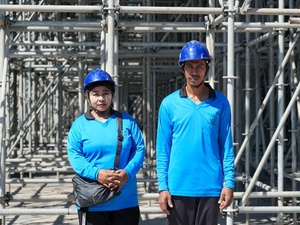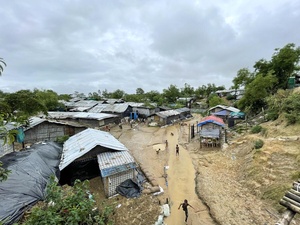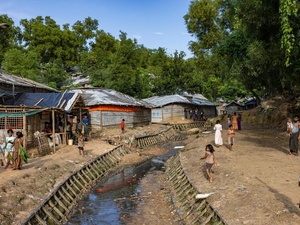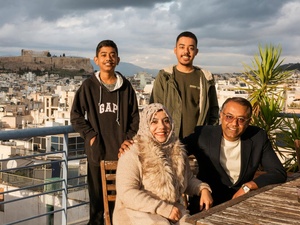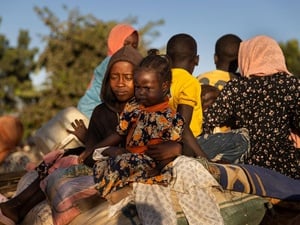After 15 years of stagnation, improvements come to Bangladesh camps
After 15 years of stagnation, improvements come to Bangladesh camps

A family poses outside their new home in Kutupalong refugee camp as neighbours look on. The house is a big improvement on the cramped, dilapidated quarters they have just moved out of.
KUTUPALONG CAMP, Bangladesh, March 22 (UNHCR) - When no other refugees were willing to move out of their ramshackle, dilapidated huts, Sokhina Khatun took the chance and was rewarded with what is - by Bangladesh refugee camp standards - a spacious, sturdy, light and airy new home.
Surprisingly, after the government of Bangladesh recently built 20 new shelters in this camp south of Cox's Bazar, refugees were reluctant to occupy them because of a false rumour that residents of the new shelters would not be eligible for much-sought-after resettlement in Canada.
"Nobody wanted to move to the new side," said Khatun, a 28-year-old mother pregnant with her sixth child. "The government gave me a key and I was the first to move in. After that other refugees followed me," she added, sitting contentedly on the floor in her new shelter.
Her home is so new she is still counting the time since she moved in - precisely 35 days today. Other refugees stop by to inspect, now inspired by the thought that their thatched huts, years past their expiry date, will also be replaced.
The new shelters, paid for by the UN refugee agency with funds from the European Commission, are part of a package of recent improvements to the two refugee camps south of Cox's Bazar, which have long been considered among the worst in the world. UNHCR plans to replace all shelters in the two camps, with 2,200 people scheduled to move in this year.
"The camps in Bangladesh are still not up to international standards," said Pia Prytz Phiri, UNHCR's representative in the country. "But the really good news is that the government of Bangladesh is working with us to make some significant improvements," she added.
After 15 years in which the refugees languished in substandard conditions, Phiri is now able to tick off a list of strides made in recent months: new shelters for everyone; another grade added to the informal education system; literacy training for adults; enhanced skills training; and improved medical care.
Médecins Sans Frontières is in the process of opening clinics in both Kutupalong and Nayapara camps, while UN agencies have been allowed to step up services, particularly to women. "What's really important is that after 15 years of an unacceptable status quo, now progress is finally being made," said Phiri.
The 26,000 refugees in the two camps - Muslims from Myanmar's northern Rakhine state, also known as Rohingyas - depend on the UN refugee agency for their care, but assistance has been limited by the Bangladesh government. There are no signs that the Rohingyas - who fled in the early 1990s - will be able to go home soon, and UNHCR would like to find other solutions for them.
"It is not tenable for UNHCR to care for these 26,000 refugees forever, so we must, together with the Bangladeshi government, find a way for them to support themselves until they are able - someday, we hope - to go home," said Phiri. Up to 200,000 others live and work among the local population without refugee status.
Whenever foreign visitors come to Kutupalong, a group of refugee women in black burqas follow with a well-worn banner listing their complaints about conditions in the camp. They've been doing this for at least six years, but one of the women admits that "now the situation is better compared to six years ago."
Nurul Islam, a father of two, said he was living with 14 relatives in one room until he moved into one of the new shelters made of thatch and corrugated metal. "My wife thinks it's very good," he said. "She's very happy because we can stay separate. Before we stayed all together in one room with my parents, my sister-in-law, all my brothers and sisters and a lot of children."
Now, he added, "the room is large and I can maintain some privacy - that is the best thing." The neighbours, who have crowded in to hear Islam tell his story to a visiting UNHCR staffer, burst into laughter at his words - privacy appears to be an unknown luxury in this cramped camp.

Old houses like these in Kutupalong camp will be replaced over the next year or so by new dwellings funded by the European Commission and UNHCR.
Khatun also takes pleasure in the fact that her mother-in-law now has a separate room, as do her children. She shares one room with just her husband, and even has a separate kitchen.
Like any proud new homeowner, Khatun is beginning to have loftier aspirations. "The ceiling here is very high," she said, in contrast to her old shelter where she could not even stand upright. "UNHCR gave us a very good shelter," she concluded. "Now UNHCR should provide electricity and a ceiling fan."
By Kitty McKinsey in Kutupalong Camp, Bangladesh


